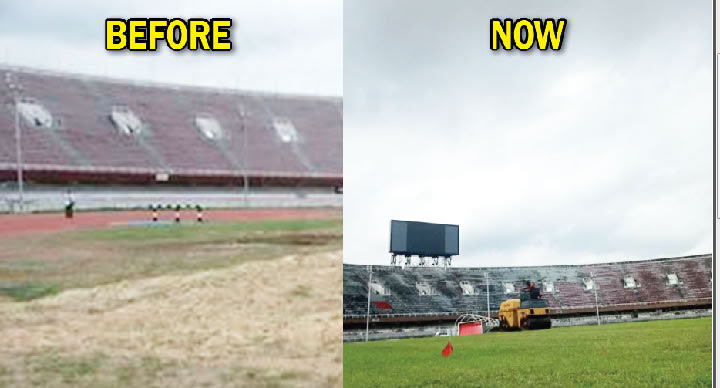News
Tears For Traders As National Stadium‘s Rescue Begins

It is hard not to remember how good things were around the National Stadium, Surulere, in Lagos in the late 70s and 80s.
The edifice put in place as Nigeria hosted the All African Games (now African Games) in 1973 was simply world-class at the time.
However, several years down the line, what was a symbol of pride and a national treasure has degenerated into an embodiment of shame and disgrace highlighting Nigeria’s failure as a country when it comes to maintenance and protecting huge investments.
Now, the attempt by the government to right its wrong as far as the stadium is concerned is turning to be a curse for some whose means of livelihood have been dealt a big blow.
Where Did It All Go Wrong?
Hurricanes announce themselves on radar screen before slamming into the unlucky coast while Tornadoes strike with little warning. If the city is lucky, tsunamis offer brief tipoffs before coming with a deluge of destruction. But no one saw the sorry state of the National Stadium coming after the Africa Cup of Nations Nigeria jointly hosted with Ghana in the year 2000.
The events that followed one of Africa’s biggest football spectacles left much to be desired.
For many, the seed of rot within National Stadium, Surulere, was sown immediately the federal government ordered its parastatals to move its headquarters to Abuja.
A former sports minister at that time was accused of single-handedly carting away generators meant for the stadium for his mother’s burial, then others followed suit, systematically stripping the stadium of all its assets.
While there is nothing wrong with the relocation itself, the sports ministry lost its vision and opted to set up the office of stadium manager, which is also not a bad idea itself.
With the Sports ministry relocated to Abuja, the office of the stadium manager became so lucrative. The stadium manager is the Capon de Tuti (BigBoss’) as far as what goes around the stadium is concerned because the bucks stop at his table.
Armed to the teeth with much power, successive Stadium managers threw caution to the wind and opened up this national edifice for external activities like wedding, religious programmes, and any other activities that fetched good money without proper monitoring.
Although business was booming, the edifice groaned under severe pressure.
The turf of the main bowl was the first to give in. Then the building itself became an eyesore, following years of neglect.
The once beautifully laid tartan tracks and aesthetically arranged seats all became a mess as the years passed by.
A tour of the National stadium in 2019 gave a clearer picture of how the edifice harboured countless squatters while illegal structures held sway.
A 34-year-old squatter, who requested not to be named, said he pays a “certain amount” to the authorities monthly.
“I pay to sleep here every night but don’t expect me to mention names now because I cannot afford to pay any landlord now,” he said.
Business Gone Sour
For those with business intentions, securing a space for structures at National Stadium can be neck-breaking.
Situated in a choice location between the Island and Mainland, the stadium welcomes thousands regularly and that is a good indicator for trading.
It is believed that the Stadium facility hosts about 200 businesses with over 3,000 employees.
Unfortunately, with the government’s recent decision to salvage what is left of the stadium, the businesses will now have to find a new address.
A well-known food vendor, who also requested anonymity for fear of being blacklisted, told PREMIUM TIMES her rent is due for renewal this August. Having spent almost two decades within the premises, she is shocked she was not spared. It later dawned on her that her days around the edifice, that had shaped her life, are numbered.
“I really don’t know why we’re being treated in this manner. I’m not an illegal occupant because I pay my rent regularly. My rent is due for renewal this August but as you all know; we were held back from coming to the stadium since April due to COVID-19 lockdown. What will happen to those four months?
“Where do I go from here? I only got seven days of quit notice. Even if the sports ministry intends to lease it to a private company, courtesy demand that the occupants are re-introduced to new owners, after which a symbiotic agreement will be reached,” she lamented.
“I really don’t know what to say right now, I’m just dazed and the whole thing is in a confused state right now. You can see that I now display my sports wares at the entrance gate,” said Stanley Eze who runs a sports shop in the stadium.
Oni Afolabi, a Lagos-based journalist, shares the pain of the affected business owners being forcefully evicted from the national stadium.
For him, the eviction of ordinary citizens, who are grappling with harsh economic realities occasioned by the coronavirus pandemic, is not well thought out and is also ill-timed.
He said: “I think the Minister of Sports, Sunday Dare, should seriously reconsider the eviction notice given to business owners within the premises of the National Stadium in Lagos because of its economic implications.
“With over 3,000 people directly and indirectly affected by this, the economic implication at this crucial period cannot be quantified.
Most governments around the world have devised means to cushion the effect of the global lockdown on their citizens, here in Nigeria, we have only introduced taxes and destroyed businesses” he added.
Mr Afolabi said while he is not averse to the National Stadium being renovated, there are ways of not making it a burden on helpless citizens who are doing legitimate all these years and paying required levies.
He said: “Nobody is kicking against this good idea of renovating the stadium, which is one of our national heritage, but there is a need to be strategic.
“At the Abuja stadium where a similar renovation is taking place, Dangote Group are only renovating the main bowl and fixing the light while we wait for other investors to key in and fix other facilities.
“The same format is expected when and if Baba Ijebu (Kensington Adebutu) takes over the National Stadium in Lagos.
“So, the total eviction of business within the national stadium, which has no direct effect on the proposed renovation of the main bowl, is in bad faith and has left much to be desired.”
Mr Afolabi called on the minister to investigate the huge monies that the stadium would have generated in past years.
He said: “They should account for the millions generated from business ventures within the stadium, toll fees collected from vehicles coming into the stadium as well as rentals from open spaces and indoor facilities.”
The immediate past president of the Sports Writers Association of Nigeria, Lagos Chapter, Fred Edoreh, is equally pained by the predicament a good deed as renovating the stadium, is causing.
He said: “I saw the anguish and hopelessness in the faces of the hundreds of old and young men and women as they scampered to remove their properties, many not knowing where to take them to and how to begin a new life.”
While Mr Edoreh is firmly in support of getting the stadium back in shape, he believes the government would have been better responsible in going about it.
“I do not see how the government would be hurt by exercising some patience with its citizens to enable them to prepare to adjust. Say a year or six months, to re-plan and relocate; say a plan to relocate them to a section of the stadium in the meantime. If only to enable them to recover from the economic disruption of COVID.”
No Friction
While many are painting a sorry picture of betrayal by the government against the people, officials suggest otherwise.
The co-chairman of the Ministerial Committee to implement the recommendations of the Task Force on the Stadium, Omatseye Nesiama, told PREMIUM TIMES how magnanimous they have been in carrying out their duties.
Mr Nesiama, a Retired Navy Commodore, shed light on the categories of occupants in the stadium and, according to him, the majority see reason with the government and are cooperating even more than anticipated.
He said; “It is true some are illegal while some are legal tenants. For illegal tenants, you can remove them at will because they have no basis at all. However, there are legal tenants that are occupying illegal positions.
“There are some legal tenants that were given temporary allocations but have erected permanent structures on areas not designated for such purposes, which now turns to illegality. So, though you are a legal tenant, you are operating illegally; so all those things are the complications we have tried to address.
On what many perceived as short notice, Mr Nesiama revealed that the minister had already made his intention know when he visited the stadium earlier in 2019.
He said: “We gave the… even the illegal ones seven days notice as required by the law to vacate the premises or would be forcefully evicted.
“After the expiration of the original seven days, we gave another seven days extra, thus making 14 days notification of the government’s intention to recover the property. Within this period, we had several engagements with these tenants, further explaining the situation and what we want to do.”
Mr Nesiama commended the level of compliance by the ejected tenants.
He said; “I can confirm to you that at least 90 per cent of them attended these fora and they were satisfied with our explanations on what we are set to do, which definitely will be beneficial to everyone using this facility.
“The good thing is that a whole lot of the tenants are well aware of our intentions and how civil we are and have operated thus far and they are willingly complying and moving out, so rather being involved in civil or legal tussles, they are more-or-less working in tandem with us.
“So, we are on course to finish the assignment in the period that has been given us” Mr Nesiama assured.
Why National Stadium Is Everyone’s Problem
While the poor state of the national stadium might seem to be federal government’s headache, if it continues to be a hub for miscreants and hoodlums, most of the crimes perpetrated in and around Surulere will be planned there.
Already, residents around Surulere know they have been sitting on a keg of gunpowder and its explosion is just a matter of time.
Besides, the sorry state of the national stadium speaks volumes of Nigeria’s poor maintenance culture. National stadium Lagos, MKO stadium Abuja, Liberty Stadium, and MKO Abiola Stadium in Abeokuta are regarded as government’s sick babies, owing to years of neglect. A country that cannot take good care of its own would not do better either, with foreign investors.
Talk is cheap – but in today’s world, you end up spending less once you cultivate a good maintenance culture. It is earnestly anticipated that the sports minister will also come up with an adequate measure to end the wailing cry of the moribund edifice.
PREMIUMTIMES
Advertise or Publish a Story on EkoHot Blog:
Kindly contact us at [email protected]. Breaking stories should be sent to the above email and substantiated with pictorial evidence.
Citizen journalists will receive a token as data incentive.
Call or Whatsapp: 0803 561 7233, 0703 414 5611












